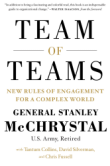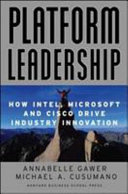
By General McChrystal et al.
The book's main plot follows the Task force of the US Army in Iraq "after" the second war when it has to adapt to a guerilla-like war against AQI (Al Qaeda in Irak).
The authors build their case for a "team of teams" kind of organisation via a succession of ReTeX accounts from military missions of that time.
They also provide summaries of non-military case studies as a way to explain how this kind of organization is relevant more generally to our current world at large. Interestingly, in doing so they confront some long time business idols like Adam Smith and Taylor and convoke a mix of unexpected (to me at least) figures like Tocqueville, Nelson, NASA's George Mueller or New-York's Mayor Bloomberg.
In some of the final chapters the authors provide a few examples of how they implemented the change in the military Task Force. The insights there are interesting but maybe the part where I would have appreciated more details.
Let's look under the hood of this team of teams.
Read more…






